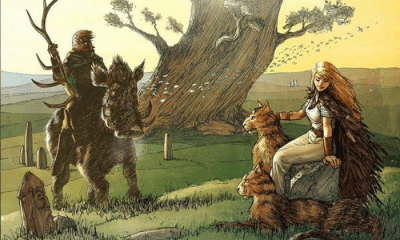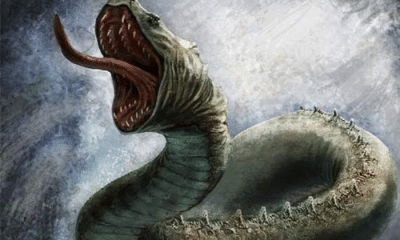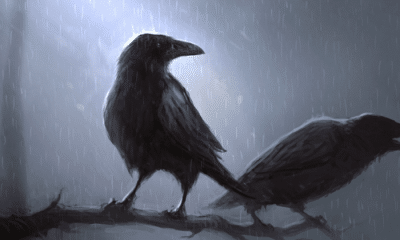Norse
Who Was Kvasir in Norse Mythology?
The ancient Norse people believed that the gift of poetry came from the blood of Kvasir, a man formed from the union of the gods.
Many ancient cultures created myths that explained how humans got the gift to create art, poetry, and music. Among the Norse, these abilities came from the blood of Kvasir.
Created from the alliance of the two types of gods, Kvasir was a man who had their combined wisdom. When he was killed for this knowledge, his blood was used to create a magical mead that granted intelligence and inspiration to especially favored people.
While Kvasir was mentioned in many myths, even playing an important role in some stories, his most lasting contribution was this Mead of Poetry. It is particularly well-remembered because the writers of the great sagas and Eddas credited Kvasir’s mead for their own words.
While the Norse legend of how humans received the gift of poetry is a bloody one, it is also not entirely unique. Its origins lie in diplomatic traditions, the custom of alcohol making, and an ancient tale of how the gods stole their sacred drink.
Kvasir and the Mead of Poetry
There were two groups of gods in Norse mythology, the Aenir and the Vasir.
Long ago, these two groups had fought one another for supremacy. They were evenly matched, however, and neither side was able to declare a victory.
Eventually, they called a truce. The two groups met to negotiate terms by which they could share power and live among one another peacefully.
As a symbol of their truce, the gods of both sides spit into a large vat. They put this mixture to good use and formed a man from it, Kvasir.
Kvasir was extremely wise and it was said that no question could ever be asked that he did not know the answer to. He traveled the world, sharing his knowledge with the human race.
Kvasir’s great wisdom featured in some of Norse mythology’s most famous stories.
For example, when the trickster Loki was accused of killing the god Baldr, he took the form of a salmon to hide in a stream near his home. Thinking of what the gods might use to catch him, Loki had knotted linen threads together but quickly burned the result so that it might not be used against him.
When the gods arrived, Kvasir spotted the outline of Loki’s crude net in the ashes of the hearth. He realized its use, and thus that Loki was hiding as a salmon, and shared his realization with the gods.
The gods crafted a new net to capture Loki. The trickster was punished for Baldr’s death and, thanks to the cleverness of Kvasir, the net was invented to make fishing easier.
Kvasir’s intelligence attracted some jealousy, however. Two dwarves, Fjalar and Galar, became convinced that they should possess such wisdom for themselves.
They invited Kvasir to their home and killed him when he arrived. They drained his blood into two vats, Són and Boðn, and a pot called Óðerir,
The two dwarves mixed the blood with honey and let it ferment. It created a potent mead which, to the delight of the murderous dwarves, granted them some of Kvasir’s legendary wisdom.
Fjalar and Galar explained Kvasir’s death by telling the gods that he had become so overwhelmed by his own intellect that he had suffocated beneath it.
They did not enjoy the fruits of their plot for long, however. When they later killed a giant, they offered the mead to his brother as compensation.
Odin soon learned that the giant Suttungr was in possession of a mead that made him exceptionally smart. The gods pieced together the story of the mead and realized that it had been made from the blood of Kvasir.
Odin attempted to win back the mead by posing as a laborer and asking for a drink of it as payment, but Suttungr refused to pay him when the time came. Instead, Odin seduced the giant’s daughter, Gunnlöd, and spent three nights with her.
For each night they spent together, Odin asked for a drink of mead. He drained each container in a single draught, however, and quickly transformed into an eagle to escape.
In his haste to fly away, Odin let a few drops of the Mead of Poetry fall to the ground. Anyone could access this tiny share, but it was impure and the abilities it granted were minor.
The majority of the mead remained in the possession of Odin. He gave small sips of it to the gods and to the most truly skilled poets of Earth, granting them inspiration and intelligence.
My Modern Interpretation
Many scholars believe that the legend of the Mead of Poetry had its roots in ancient rituals the made peace and bound communities together.
Kvasir was said to be formed from the spit of the gods which was mixed as a sign of their truce. This probably originates in real-world practices in which both the intermixing of spittle and the consumption of alcohol were signs of peacemaking.
In fact, this ancient tradition persisted in the modern world. Although less popular today, the practice of spitting into one’s hand before shaking on an agreement comes from this ancient ritual.
While this has fallen out of favor, sharing a drink is still a common way of forming and strengthening bonds.
The creation of the mead of poetry may also reflect ancient methods of making a crude alcoholic drink from pressed berries.
In many ancient cultures, people would come together to chew berries and spit them into a central container before pressing them. This not only served to speed up fermentation, as the enzymes in their saliva helped to break down the fruits, but also to reinforce the bonds of the community.
In fact, the name Kvasir could be related to a fermented drink that is still popular in many Slavic countries, kvass. Coming from a common root word that refers to fermentation and alcohol, this makes Kvasir a personification of such drinks.
As such, Kvasir represented the shared drinks that bound the Aesir and Vanir gods. He also represented the intoxication that could inspire works of poetry and creativity.
Mead was the drink of choice for the Norse gods, but the story of Kvasir also has parallels outside of Northern Europe. In India, the drink of the gods was Soma.
In the Sanskrit Vedas, Soma was both a plant and a beverage that granted the gods their vitality. It was originally held captive and had to be stolen for the gods, either by Indra or by an eagle acting on their behalf.
The similarities between the theft of Soma by Indra and the theft of the Mead of Poetry by Odin show that this likely comes from a shared Proto-Indo-European source.
While Soma remained the exclusive property of the gods, however, the Mead of Poetry could be shared. In Norse writing, Kvasir’s blood was a common euphemism for poetry and skalds were said to have drunk from Óðerir.
In Summary
In Norse mythology, Kvasir was a man created after the peace deal between the Aesir and Vanir gods. When the two groups formed a truce, they spit into a vessel and used this to create Kvasir.
He was known for his exceptional wisdom, which he used to help both humans and the gods. For example, when Loki tried to hide after the death of Baldr it was Kvasir who discovered him by realizing what the first net could be used for.
Kvasir was most famous, however, for being the source of the Mead of Poetry.
Two dwarves killed Kvasir to obtain his wisdom. They mixed his blood with honey to make a mead that imparted inspiration.
They lost the mead to a giant, from whom it was later stolen by Odin in the form of an eagle. He kept the mead and gave it to favored humans to make them great skalds, or poets.
The story of Kvasir is likely inspired by the use of both spittle and alcohol in forming bonds, both within communities and between former foes. It reflects traditional ways of coming to agreements and making alcoholic drinks.
It also has parallels to an ancient Indian myth in which Indra steals Soma, the drink of the gods. The similarities between the two stories indicate that they share a Proto-Indo-European origin.
The story of Kvasir and the Mead of Poetry remembered both in mythology and in the kennings, or poetic terms, of Norse writers. They credited their words to Kvasir’s blood, a gift from Odin.









